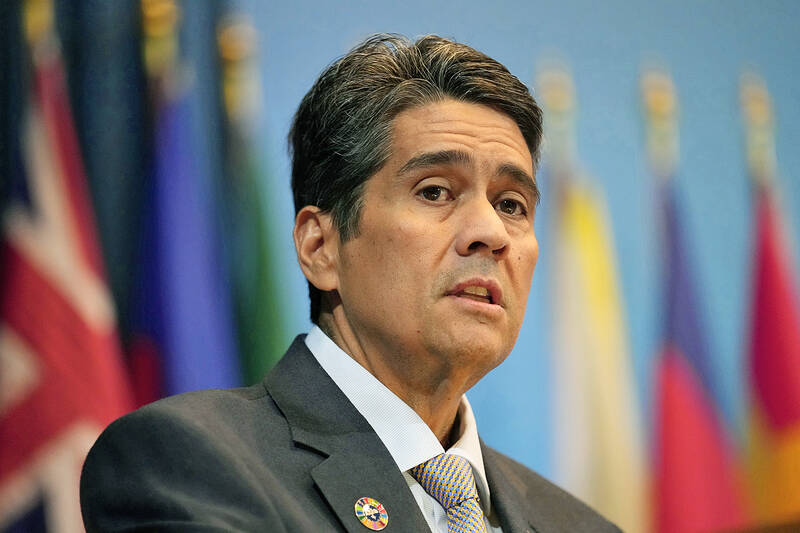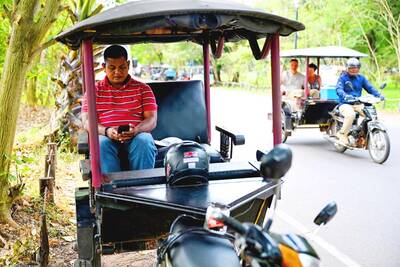Pacific Island leaders are criticizing rich countries for not doing enough to control climate change despite being responsible for much of the problem, and for profiting from loans provided to vulnerable nations to mitigate the effects.
Leaders and representatives from Pacific Island nations on Monday demanded at a UN climate change conference in Bangkok that the world make more of an effort to put aside differences in combating environmental impacts, especially as their countries emerge from the economic devastation of the COVID-19 pandemic.
Cook Islands Prime Minister Mark Brown said the finance model for combating climate change — giving out loans to reduce the effects — is “not the way to go” for countries in his region with such small populations that produce “inconsequential amounts of carbon emissions,” but suffer the most from the effects.

Photo: AP
He encouraged a shift toward grants or interest-free loans to help ease the financial burden on poorer countries.
“All we’re doing is adding debt to countries that have come out of COVID with increased debt, and to me it is actually quite offensive that we would be required to borrow money to build resilience, and to borrow from the very countries that are causing climate change,” he said.
Brown said his country lost an estimated 41 percent of its GDP because of the pandemic, “a loss of a decade’s worth of prosperity.”
He said he would give this message to leaders when he represents his tiny South Pacific nation with a population of about 17,000 at a summit later this week of the G7 leading industrialized nations in Japan, where he hopes to be able to speak on a more equal footing to the leaders than as “a grateful recipient” to “benevolent donors.”
Palauan President Surangel S. Whipps Jr said that financing opportunities are “few and difficult,” and criticized wealthy countries for failing to commit to provide the financial help they had promised, which he said represents only a tiny portion of their prioritized expenditures, such as the military.
“We didn’t cause the problem, but now they’re going to make money off of us by giving us a loan so we can pay back with interest,” he said. “So now you have to adapt, but we’ll give you money and make money off of you by giving you that money to adapt. That doesn’t make sense.”
Palau’s economy relies heavily on tourism, which is greatly threatened by the effects of climate change, Whipps said.
The country’s economic security is also a major issue in Palau’s negotiations with the US on the Compacts of Free Association, a broader agreement that is to govern its relations with Washington for the next two decades. Those ties grant the US unique military and other security rights in the islands in return for substantial aid.
US President Joe Biden’s administration has promised approximately US$900 million over the 20-year period, Whipps said.
He said that while the amount is “definitely less” than what his country would have wanted, he is largely satisfied with the terms, renegotiated from what was achieved during the administration of former US president Donald Trump.
While there are some concerns that the US Congress could cut foreign aid, affecting the funding, Whipps said he expects Washington to honor the agreement, which he hopes can be signed by both sides in Papua New Guinea next week.

The death of a former head of China’s one-child policy has been met not by tributes, but by castigation of the abandoned policy on social media this week. State media praised Peng Peiyun (彭珮雲), former head of China’s National Family Planning Commission from 1988 to 1998, as “an outstanding leader” in her work related to women and children. The reaction on Chinese social media to Peng’s death in Beijing on Sunday, just shy of her 96th birthday, was less positive. “Those children who were lost, naked, are waiting for you over there” in the afterlife, one person posted on China’s Sina Weibo platform. China’s

‘NO COUNTRY BUMPKIN’: The judge rejected arguments that former prime minister Najib Razak was an unwitting victim, saying Najib took steps to protect his position Imprisoned former Malaysian prime minister Najib Razak was yesterday convicted, following a corruption trial tied to multibillion-dollar looting of the 1Malaysia Development Berhad (1MDB) state investment fund. The nation’s high court found Najib, 72, guilty on four counts of abuse of power and 21 charges of money laundering related to more than US$700 million channeled into his personal bank accounts from the 1MDB fund. Najib denied any wrongdoing, and maintained the funds were a political donation from Saudi Arabia and that he had been misled by rogue financiers led by businessman Low Taek Jho. Low, thought to be the scandal’s mastermind, remains

Australian Prime Minister Anthony Albanese yesterday announced plans for a national bravery award to recognize civilians and first responders who confronted “the worst of evil” during an anti-Semitic terror attack that left 15 dead and has cast a heavy shadow over the nation’s holiday season. Albanese said he plans to establish a special honors system for those who placed themselves in harm’s way to help during the attack on a beachside Hanukkah celebration, like Ahmed al-Ahmed, a Syrian-Australian Muslim who disarmed one of the assailants before being wounded himself. Sajid Akram, who was killed by police during the Dec. 14 attack, and

VISHNU VANDALS: A Cambodian official accused Thailand of destroying a statue in a disputed border area, with video showing the Hindu structure being torn down The Thai military said ceasefire talks with Cambodia, set to begin yesterday, are expected to conclude with a meeting of the countries’ defense ministers on Saturday, as the two sides seek to end weeks of deadly clashes. The talks started at 4pm in Thailand’s Chanthaburi Province, which borders Cambodia. The Thai Ministry of Defense outlined several demands to be discussed ahead of the bilateral meeting of the General Border Committee (GBC) on Saturday. If secretariat-level discussions fail to reach agreement on key technical frameworks such as troop deployments, the Thai side would not proceed with the GBC meeting or sign any agreement on